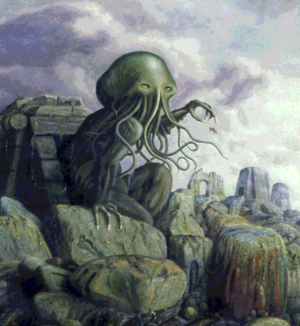Difference between revisions of "Cthulhu"
(add reference link) |
m |
||
| Line 3: | Line 3: | ||
Some have suggested a connection between Cthulhu and Judeo-Christian figures such as [[Satan]], though this comparison is shaky at best. In every Lovecraft story, the universe is full of strange and terrible entities that humans mistakenly call Gods, Cthulhu being a powerful but not unique creature with Godlike powers. Lovecraft himself was an Athiest, and his stories reflected his views of humanity's role in the universe as insignificant and at the mercy of greater, unknown powers.{{fact}} | Some have suggested a connection between Cthulhu and Judeo-Christian figures such as [[Satan]], though this comparison is shaky at best. In every Lovecraft story, the universe is full of strange and terrible entities that humans mistakenly call Gods, Cthulhu being a powerful but not unique creature with Godlike powers. Lovecraft himself was an Athiest, and his stories reflected his views of humanity's role in the universe as insignificant and at the mercy of greater, unknown powers.{{fact}} | ||
| + | |||
| + | He is also credited with beating up Joeseph and eating Mary. When questioned later, he merely rumbled 'I did it for the lulz'. | ||
==References== | ==References== | ||
Revision as of 19:25, May 21, 2008
Cthulhu (pronounced "K'Thoo Loo") (Other spellings: Kutulu, Ktulu, Cthulu, Kthulhut, Thu Thu, Tulu) is a fictional entity (One of the so-called Great Old Ones) variously described as a "sleeping" or "dreaming" in the works of H. P. Lovecraft. Cthulhu sleeps in the sunken city of R'lyeh and when the stars are right, will reawaken ushering in the destruction of humanity. It is featured in the eponymous short story The Call of Cthulhu, as well as many other works by both Lovecraft and his contemporaries.
Some have suggested a connection between Cthulhu and Judeo-Christian figures such as Satan, though this comparison is shaky at best. In every Lovecraft story, the universe is full of strange and terrible entities that humans mistakenly call Gods, Cthulhu being a powerful but not unique creature with Godlike powers. Lovecraft himself was an Athiest, and his stories reflected his views of humanity's role in the universe as insignificant and at the mercy of greater, unknown powers.[Citation Needed]
He is also credited with beating up Joeseph and eating Mary. When questioned later, he merely rumbled 'I did it for the lulz'.
